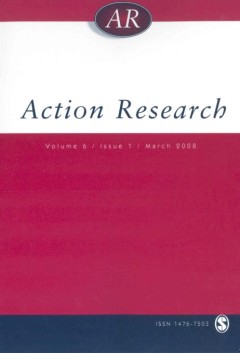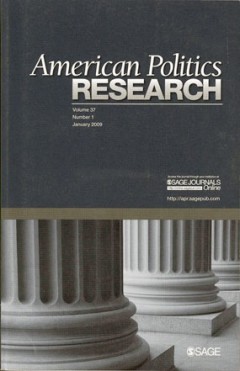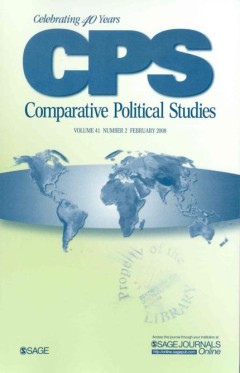Filter by

Making habitable space together with female Chinese immigrants to Hong Kong: …
When women from mainland China are newly arrived in Hong Kong, their first difficulty is usually environmental stress. Their socio-economic situation often limits their ability to express their expectations related to their living space. In order to enable the women to voice their views and become participants in urban planning, our research group adopted interdisciplinary participatory action …
- Edition
- Vol. 6, No. 3, Page 261-283
- ISBN/ISSN
- 1476-7503
- Collation
- -
- Series Title
- Action Research
- Call Number
- -
Voices from the field: Practitioner reactions to collaborative research initi…
Numerous accounts of the difficulties encountered in research collaborations can be found in the extant literature. Most of these accounts, however, are from the perspective of academically based researchers. Comparatively little is known about how agency staff respond to these initiatives. To address this gap in knowledge, the article describes the challenges encountered during a research coll…
- Edition
- Volume 6, No. 4, December 2008, p. 373-390
- ISBN/ISSN
- 1476-7503
- Collation
- -
- Series Title
- ACTION RESEARCH
- Call Number
- -
Action research, practical challenges and the formation of theory
It is a common assumption that action research exists in a number of varieties. In efforts to explain these varieties, the point of departure is sometimes sought in differences in practical challenges, sometimes in differences in theoretical outlook. Taken separately, these perspectives can, however, both be too limited. Drawing upon an action research tradition that has been in existence for f…
- Edition
- Volume 6, No. 4, December 2008. p. 421-437
- ISBN/ISSN
- 1476-7503
- Collation
- -
- Series Title
- ACTION RESEARCH
- Call Number
- -
An existential approach to engaging adult learners in the process of legitimi…
The aim of this study is two-fold. One is evaluating the action research process and how the existential situations of the inquiry influence the process of intervention. The second is generating and analysing the thematic structure of the learners' reconstructions of their lived experiences. The study highlighted that through challenging, one can convince learners to legitimate their narrative …
- Edition
- December 2008, Volume 6, No. 4 , p. 391-420
- ISBN/ISSN
- 14767503
- Collation
- -
- Series Title
- ACTION RESEARCH
- Call Number
- -

The Effects of Media Interpretation for Citizen Evaluations of Politicians' M…
Although politicians prefer to communicate directly with the public, political sound bites in the nightly news are shrinking and primetime presidential press conferences are becoming increasingly uncommon. Instead, people primarily receive the messages of politicians as interpreted by journalists. What are the consequences of this interpretation for how citizens evaluate political messages? Thi…
- Edition
- Vol. 37, No. 1, January 2009.pp. 129-154
- ISBN/ISSN
- 1532-673x
- Collation
- -
- Series Title
- American Politics Research
- Call Number
- -

Strange Bedfellows: The Policy Consequences of Legislative—Judicial Relatio…
This research examines the relationship between courts and legislatures in a comparative perspective. Specifically, I examine how (a) the ideological composition of the bench, (b) the propensity of court involvement in a given policy area, and (c) the disposition of court decisions in a given policy area influence the ideology of bill introductions and policy enactments by state legislatures. B…
- Edition
- Vol. 37, No. 1, January 2009.pp. 3-29
- ISBN/ISSN
- 1532-673x
- Collation
- -
- Series Title
- American Politics Research
- Call Number
- -

Initiative Campaigns: Direct Democracy and Voter Mobilization
Previous research has found that the campaigns of candidates running for office provide information to voters and can increase turnout. Scholarly research has also found that states with initiatives and referendums appearing on the ballot have higher voter turnout, especially in midterm elections. However, actual initiative campaigns are rarely measured. Drawing on national survey data and stat…
- Edition
- Vol. 37, No. 1, January 2009.pp. 155-192
- ISBN/ISSN
- 1532-673x
- Collation
- -
- Series Title
- American Politics Research
- Call Number
- -

Uncertain Precedent: Circuit Court Responses to Supreme Court Plurality Opinions
To what extent do lower court judges follow Supreme Court plurality opinions? By examining treatments of Supreme Court cases from the 1976-1986 terms by the Circuit Courts of Appeals from 1976 to 2005, this article addresses the consequences of the Supreme Court's failure to reach a clear majority decision. I find evidence that lower courts are less likely to follow plurality opinions than majo…
- Edition
- Vol. 37, No. 1, January 2009.pp. 30-49
- ISBN/ISSN
- 1532-673x
- Collation
- -
- Series Title
- American Politics Research
- Call Number
- -

"Such Inferior Courts . . .": Compliance by Circuits with Jurisprudential Reg…
Through its rulings, the U.S. Supreme Court makes clear what the Constitution means and how best to interpret congressional statutes. But, because Supreme Court rulings do not implement themselves, the Court is dependent on compliance by lower courts to effectuate its policies. Using the concept of jurisprudential regimes developed by Richards and Kritzer in 2002 and specifically the Establishm…
- Edition
- Vol. 37, No. 1, January 2009.pp. 75-106
- ISBN/ISSN
- 1532-673x
- Collation
- -
- Series Title
- American Politics Research
- Call Number
- -

Public Schools, Religious Establishments, and the U.S. Supreme Court: An Exam…
The issue of devotional activity in the public schools has long been a staple of the U.S. Supreme Court's agenda, but knowledge of the local implementation of school prayer policy remains limited to the Court's earliest decisions. To what extent are schools presently engaged in religious activities prohibited by the Court? This study addresses this question through a survey in which recent high…
- Edition
- Vol. 37, No. 1, January 2009.pp. 50-74
- ISBN/ISSN
- 1532-673x
- Collation
- -
- Series Title
- American Politics Research
- Call Number
- -

Confidence in Government and Emotional Responses to Terrorism After September…
In the aftermath of September 11, 2001, an unusually large percentage of Americans expressed high levels of confidence in the institutions charged with responding to the terrorist attacks. By the following summer, such confidence had declined significantly. This study draws on data from a panel study conducted in fall 2001 and summer 2002 to track Americans' emotional responses to terrorism and…
- Edition
- Vol. 37, No. 1, January 2009.pp. 107-128
- ISBN/ISSN
- 1532-673x
- Collation
- -
- Series Title
- American Politics Research
- Call Number
- -

After the Credits Roll: The Long-Term Effects of Educational Television on Pu…
Television has replaced the newspaper as the major source of news for most people, and thus has the potential to inform the public and influence attitudes. A growing literature has demonstrated the immediate effects of television viewing, but the ability of a particular program to have lasting effects is less clear. In this article, we report on two field experiments that provide a test of the …
- Edition
- Vol. 37, No. 2, March 2009.pp. 275-300
- ISBN/ISSN
- 1532673x
- Collation
- -
- Series Title
- American Politics Research
- Call Number
- -

Direction Versus Proximity: Amassing Experimental Evidence
Scale limitations, endogeneity problems, and observational equivalence in observational studies render many tests of the proximity and directional models inconclusive. Fortunately, the task of designing experimental tests has proven tractable and the small, but growing, body of experimental evidence sheds new light on directional and proximity motivated behavior. The experiment described in thi…
- Edition
- Vol. 37, No. 2, March 2009.pp. 227-253
- ISBN/ISSN
- 1532-673x
- Collation
- -
- Series Title
- American Politics Research
- Call Number
- -

Emotions as Moderators of Information Cue Use:Citizen Attitudes Toward Hurric…
Despite the extensive literature on the effects of party and other information cues on citizens' attitudes and behaviors, there exists little evidence and theory on how individuals balance multiple sources of information, particularly in the domain of blame attribution. Furthermore, we have a limited understanding of what individual characteristics moderate the use of such information. We desig…
- Edition
- Volume 37, Number 2, March 2009. pp. 301-326
- ISBN/ISSN
- 1532-673x
- Collation
- -
- Series Title
- American Politics Research
- Call Number
- -

Get-Out-The-Vote Phone Calls: Does Quality Matter?
This article reports the results of a field experiment testing the effectiveness of different quality get-out-the-vote (GOTV) nonpartisan phone calls. During the week preceding the November 2004 election, we randomly assigned registered voters in North Carolina and Missouri to one of three live phone calls with varying length and content. The scripts are (1) standard GOTV, (2) interactive GOTV,…
- Edition
- Vol. 37, No. 2, March 2009.pp. 353-369
- ISBN/ISSN
- 1532-673x
- Collation
- -
- Series Title
- American Politics Research
- Call Number
- -

What Do Voters Need to Know?: Testing the Role of Cognitive Information in As…
Previous field experiments have found that indirect methods, particularly direct mail, are not effective in increasing voter turnout. Most of the mail used in these experiments provided procedural information regarding voting and a message encouraging the voter to turn out. Yet, in his review of efforts to increase voting, Berinsky (2005) concluded that it was the cognitive costs of voting�the …
- Edition
- Vol. 37, No. 2, March 2009.pp. 254-274
- ISBN/ISSN
- 1532-673x
- Collation
- -
- Series Title
- American Politics Research
- Call Number
- -

Experimental Justice: Random Judicial Assignment and the Partisan Process of …
This study utilizes the random assignment of judges to panels in the U.S. courts of appeals to measure how the partisanship of these judges affects whether or not the Supreme Court agrees to hear a case and subsequently overturns the decision of the lower panel. Results from the study provide evidence of partisan behavior in the Supreme Court review process in several politically salient issue …
- Edition
- Vol. 37, No. 2, March 2009.pp. 195-226
- ISBN/ISSN
- 1532-673x
- Collation
- -
- Series Title
- American Politics Research
- Call Number
- -

Does Grassroots Lobbying Work?: A Field Experiment Measuring the Effects of a…
There are few reliable estimates of the effect of grassroots lobbying on legislative behavior. The analysis in this article circumvents methodological problems that plague existing studies by randomly assigning legislators to be contacted by a grassroots e-mail lobbying campaign. The experiment was conducted in the context of a grassroots lobbying campaign through cooperation with a coalition o…
- Edition
- Vol. 37, No. 2, March 2009.pp. 327-352
- ISBN/ISSN
- 1532-673x
- Collation
- -
- Series Title
- American Politics Research
- Call Number
- -

Beyond Clientelism: Incumbent State Capture and State Formation
In choosing strategies of state capture (the extraction of private benefits by incumbent officeholders from the state), rulers choose whether to share rents with popular constituencies and whether to tolerate competition. These choices are conditioned by existing organizational endowments, the costs of buying support, and the trade-off between the cost and probability of exit from office. In tu…
- Edition
- Vol. 41, No. 4/5, Page 638 - 673
- ISBN/ISSN
- 0010-4140
- Collation
- -
- Series Title
- Comparative Political Studies
- Call Number
- -

Does Religion Distract the Poor?: Income and Issue Voting Around the World
This article asks whether religion undermines the negative relationship between income and left voting that is assumed in standard political economy models of democracy. Analysis of cross-country survey data reveals that this correlation disappears among religious individuals in countries that use proportional representation. This is the case in large part because there is a moral values …
- Edition
- Vol. 41. No. 4/5, Page 437-476
- ISBN/ISSN
- 0010-4140
- Collation
- -
- Series Title
- Comparative Political Studies
- Call Number
- -
 Computer Science, Information & General Works
Computer Science, Information & General Works  Philosophy & Psychology
Philosophy & Psychology  Religion
Religion  Social Sciences
Social Sciences  Language
Language  Pure Science
Pure Science  Applied Sciences
Applied Sciences  Art & Recreation
Art & Recreation  Literature
Literature  History & Geography
History & Geography